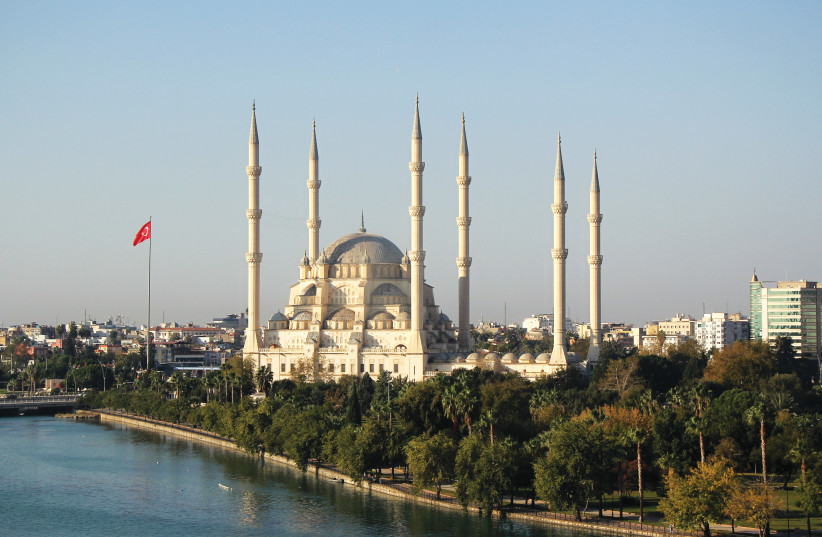Turkey’s tourism industry is expected to surpass pre-pandemic levels this year, experts in the sector told The Media Line, as the industry is set to get a major boost from Turkey’s weakened lira and improved ties with neighbors.
For more stories from The Media Line go to themedialine.org
“It is full of tourists everywhere,” said Sebnem Altin, a tour guide in Turkey.
Altin says she already has seen at least a 20% increase in bookings in recent weeks despite currently being in the midst of the low season for the sector, which she believes means that it is very likely tourism will surpass numbers from 2019, before the pandemic wreaked havoc on the industry.
“If you go to Aya Sophia, Sultanahmet Square, the most important touristy centers of Turkey, it is full, … which is a great indicator that it will be even more crowded” in the future, she told The Media Line.

She adds that her contacts in the hotel industry have told her they are getting near-full bookings for visits starting in the spring, when Turkey’s large southern coastline begins to be popular with beachgoers.
Security concerns could dampen those expectations, however.
In November, a bomb exploded on a popular pedestrian mall in Istanbul, a magnet for tourists, and there are fears that hotly contested national elections expected this spring could lead to instability.
But hopes are high that tourism in the country will straighten out this year.
“If things remain calm, I have no doubt they will surpass the numbers of 2019,” said Joseph Fischer, an international tourism and hospitality expert with a focus on Turkey and Israel.
Turkey’s Culture and Tourism Minister Mehmet Nuri Ersoy stated in December that the government expected $46 billion in tourism revenue in 2023, Hurriyet Daily News reported.
Altin says visitors are still coming for cultural tourism, which focuses on travel throughout the country to visit historical cities and museums, which benefits all.
“They eat in each and every city they go to, they go shopping in these cities,” she said of the tourists. “Anybody and everybody along their routes benefits from this tourism.”
Turkey’s improved relations with its neighbors and its weakened lira is helping boost tourism numbers.
The country’s currency lost 44% of its value against the US dollar in 2021 and, while the currency has stabilized since, it has made travel to Turkey far cheaper than its western competitors.
Tourism is a key sector for Turkey’s struggling economy that is batting massive inflation at more than 64%, according to official statistics, although independent economists believe the number is much higher.
That has put major pressure on the popularity of Turkish President Recep Tayyip Erdogan, who is facing reelection this year.
Erdogan, who has governed during a period of major growth for his country, has been blamed by many economists for Turkey’s dire finances due to his unwillingness to increase interest rates to combat inflation.
Altin says that while people have been eager to resume traveling, she senses they were concerned about keeping their jobs and income.
“Inexpensive countries or destinations which offer them the same product for a less amount of money [are] more charming at the moment and that’s the advantage of Turkey,” she said.
Altin says many of the visitors currently coming are from the Far East and there has specifically been a rise in tourists from Arabic-speaking countries who often visit Turkey for shopping.
In an attempt to attract foreign investment ahead of elections, Erdogan moved to improve ties with regional neighbors, including Saudi Arabia, after a major fallout over the murder of Saudi journalist Jamal Khashoggi.
Turkey also has benefited from not closing its airspace to Russian planes and allowing Russian citizens to visit without visas even after its invasion of neighboring Ukraine.
In July, Turkey and Israel signed an aviation agreement that allowed Israeli airlines to fly to Turkey for the first time since 2007 amid a thawing of ties between the two countries.
Fischer says that Israel’s close proximity to Turkey, with one-hour flights to popular beaches, has made the country a top choice for Israeli tourists.
The country’s easily accessible halal meat and hotels that offer women-only swimming pool hours make it an attractive destination for many Arab Israelis, he added.
“It’s like local tourism,” Fischer said.
